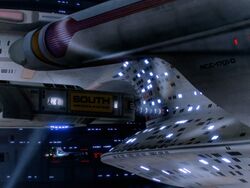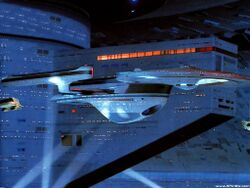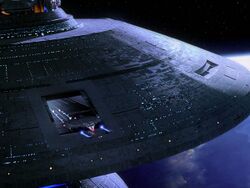Starbase 72
More actions
Starbase 72 is a Spacedock-class station located in the Minos Korva system, and it has been a major hub for Starfleet activity along the Federation-Cardassian border since the mid-2360s. Currently, it is the headquarters for Task Force 72 and serves as a major repair and resupply station for vessels assigned to combat the True Way.
History
The Minos Korva system has long been strategically important to both the Federation and the Cardassian Union. In the 2350s, the Cardassians attempted to annex the system, but Starfleet prevented this by stationing several starships there. In 2369, the Cardassians again made aggressive moves towards Minos Korva, but were detected and turned away by Captain Edward Jellico aboard the Enterprise-D. As the colony on Minos Korva grew, it was decided that a full-scale starbase was required to keep the system secure.
In order to expedite construction, it was decided to deploy a Spacedock-class station rather than the newer, larger Spacedock II-class station, as there were sufficient spare parts and unused modules in storage around the Federation that it could be done very quickly. Construction on Starbase 72 began in early 2370, concluding by the start of the Dominion War in 2373. Minos Korva was again put in the cross-hairs, and the system was the site of several battles, but neither the Cardassians nor Dominion managed to take the system, thanks to the presence of Starbase 72 and elements of the Fourth Fleet, which were assembled into Task Force 72.
After the Treaty of Bajor it was an important staging point for relief missions into the crippled Cardassian Union. Though dated by 2399, it remains an important Starfleet installation in the region.
Current Status
Most of the ships operating out of Starbase 72 have been tasked with securing Federation space throughout the Former Demilitarized Zone, which has become volatile with the presence of the Cardassian extremist sect, the True Way. While Minos Korva itself has not been attacked since the height of the Dominion War, the system is currently on high alert, with all vessels entering and exiting the system subject to scans and inspection to try to stamp out the True Way's access to resources.
As part of the peacekeeping operations in the former DMZ, Starbase 72 currently fields two dozen hazard teams, which operate from the station's fleet of runabouts. These teams perform a wide variety of missions near the station, ranging from diplomatic escort missions, scouting and patrol, and direct protection of Federation assets from the True Way.
This base is also the staging ground for new officers assigned to command vessels assigned to Task Force 72, with a large concentration of diplomatic specialists, personnel officers, and other individuals whose job is to help potential commanders develop their diplomatic abilities, many of whom spend at least some time in the field on the station's runabouts.
Description
Like all Spacedock-class stations, Starbase 72 is a combination defensive, trade, and shipbuilding facility, with the capacity to house dozens of starships within its large docking bay. It can service hundreds of smaller vessels with numerous other facilities located throughout the station. It has a Starfleet crew of 30,000 and 20,000 civilians of many nationalities live aboard the starbase. A central transport column connects the station from top to bottom, with turbolifts for local service and multi-story trams for journeys that go multiple kilometers. While localized transporters have become common on ground facilities, Starbase 72 has not yet been upgraded with this technology.
Command and Control Facilities
Administration of such a large station is complex, and there are a number of different facilities that have varied roles in handling station operations, docking bay operations, and task force operations.
Station Operations
There are four identical operations centers every ninety degrees along the primary docking bay, in the center of the main shuttlebays. Primary station control and space traffic control are handled from the facility at the 12 o'clock position on the base, with the other three facilities handling approach procedures for vessels in their quadrant of the station. The commodore's office is located within the primary operations center, and the operations centers are each a short walk from the viewing galleries that line the interior of the primary docking bay.
An emergency operations center is located at the top of the station, near the transport column. It is heavily shielded and armored, meant to be used in combat situations where the station's powerful shields could be threatened. The operations centers can also be protected by duranium doors that slide over their viewports, as well as over the openings to the shuttle bays.
Docking Bay Operations
Starships within the primary docking bay are controlled from facilities within the arms of the station's docking column, with one facility per quadrant and hence per set of space doors. It's from here that the station's docking controllers can perform very fine maneuvers of even the largest starships by remote control.
Task Force Operations
Task Force 72's operations are separate from those of the station itself, as this unit is responsible for sensitive diplomatic operations across the galaxy. As such, the Task Force Operations Center is located close to its own dedicated communications antennae on the top of the station, with facilities to take in data and reports from many starships at once, as well as offices for task force staffers.
Docking Facilities
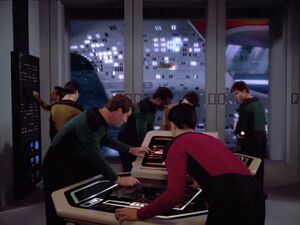
One of the most distinctive features of a Spacedock-class starbase is the large dome-shaped docking facility located on the top of the station, but there are also numerous other hangers and docking ports all around the station.
Primary Docking Bay
The primary docking bay has large space doors which can accommodate most cruiser-sized starships, though large starships must orbit the station unless they need long-term support. A single large starship, up to the size of an Odyssey-class heavy explorer can be serviced in a single large bay beneath the arboretum. Within the docking bay is a central docking tower with four arms at the same plane as the main doors and four much smaller arms lower on the structure. The upper structure can handle up to eight small starships or four large starships. This is where most visiting starships are berthed. The lower structure is normally used for long-term storage, refit, or construction of starships, and can also handle eight small starships or four large starships.
Shuttle and Runabout Bays
The station has runabout and shuttle launch facilities within the primary docking bay, and spread regularly along the central column in most sections of the station. These bays also service small starships that are capable of landing. The station's primary shuttle/runabout facilities are located in four bands along the outer hull of the primary docking facility, which allow shuttles to pass directly between the interior of the docking facility and space.
Docking Ports
While all but the largest starships could comfortably fit within the primary docking bay, there are various reasons that a starship might need to be docked externally, and so there are docking ports ringing the station's primary docking bay, beneath the primary docking bay, and at several other points around the station. Freighters and transports often use these ports when they are only at the station long enough to drop off and pick up passengers or cargo. They are also frequently used by foreign starships that might not be compliant with the protocols for internal docking.
Recreational Facilities
As a modern Starfleet facility, Starbase 72 has virtually every recreational opportunity one could wish for, and those it doesn't have physically can be recreated on one of its hundreds of holodecks.
Arboretum

The station's arboretum is located in the upper third of the dome-shaped structure halfway down the station's primary core. This massive facility simulates an M-class environment over three square kilometers with a sky projected on the domed ceiling, with flora from numerous worlds planted in discrete areas in a park-like environment. The arboretum is also dotted with a few structures, such as gazebos for gatherings, an amphitheater, sports fields, and memorial gardens. The edge of the arboretum is several decks taller than the center, giving it a bowl shape overall, which allows for the arboretum's mechanics to be concealed under the terrain. This is the site for many of the station's physical fitness classes, and the track around the exterior of the arboretum provides over six kilometers for running and other calisthenics. The transport column runs through the center of the arboretum and it's the only real sign that you're still aboard a space station. There aren't any animals in the arboretum. The station's promenade is located around the edge of the ground level of the arboretum, with multiple access points along the outer path, as well as within structures in the hills of the outer region of the park. The arboretum is divided into four quarters, with quadrants A, B, and C each having a central feature among the gardens and park areas listed below, while quadrant D is specifically designated as a botanical garden.
Memorial Amphitheater - Quadrant A
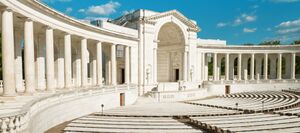
Built to honor the sacrifices of Starfleet and Allied forces who perished during the Dominion War, the Memorial Amphitheater is the site for important ceremonial events, such as funerals, changes of command, retirements, and promotions. It is located near to the center of the arboretum, about twenty meters away from the central travel column. Made to resemble a similar structure found in Earth's Arlington National Cemetery, seating for 4,000 faces a small stage. The seating area is ringed by a double colonnade, with panels behind the outer columns bearing the names of the 10,215 people who died in service to the Federation during the Dominion War in the Minos Korva sector or since then as crew members of Starbase 72. Behind the stage is a lobby area that is often used for receptions before or after ceremonies, with a non-denominational chapel beneath it. Unlike the structure upon which it was based, the Memorial Amphitheater contains no burials. Due to its sheltered location within the heart of the station, emergency command and control systems are concealed within the amphitheater, as well as an emergency transporter platform.
Jaresh-Inyo Stadium - Quadrant B
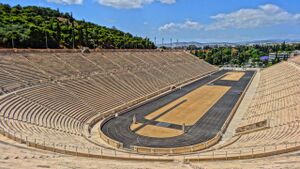
Named for the President of the United Federation of Planets at the time that the starbase was commissioned, the stadium is a replica of the Panathinaïkó Stádio in Athens on Earth, an elliptical structure open on one end and fitted with unadorned marble seating for up to 45,000 individuals. It is the only structure on the station that can hold the majority of the crew at the same time, though this happens only very rarely for exceptional ceremonies. It is most often used for sporting events, with the floor of the arena being holographically configurable for any number of team or individual events, ranging from track and field to soccer to parrises squares. It is located on the opposite side of the central column from the amphitheater, up in the hills of the park. When not in use for a formal function, the default configuration of a running track is used, making it popular for exercise. The marble seating isn't particularly comfortable for long games, but it's an excellent area for cardiovascular exercise.
The Sentinel Café & Arboretum Lake - Quadrant C
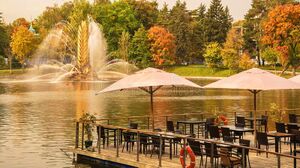
Located between the amphitheater and the stadium, the roughly oval-shaped lake on the promenade is relatively small, but it is suitable for swimming at just over three meters deep, with a surface area of approximately 750 square meters. One end of the lake has a café run by Starfleet but staffed with non-holographic personnel, a relative rarity for Starbase 72's non-civilian offerings. The Sentinel Café serves a wide variety of foods from across the Federation, but it specializes in small, summery items suitable for eating outdoors in the perpetual 75-degree, mildly-breezy weather of the arboretum. This is a favorite spot for many of the station's permanent crew, as well as for visiting starship crews, as it is the place on the station that feels the closest to a real al fresco dining experience. It is managed by a chatty Bolian named Ven Goha, who likes to get to know his regulars, even if they'd prefer to eat rather than be grilled about their life stories. He's not particularly good at recommending food to non-Bolians, though, as he often forgets how much most other Humanoids dislike the things that Bolians find appetizing, such as rotting meat and other inedible items.
Botanical Gardens - Quadrant D
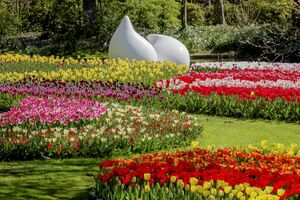
The fourth quadrant of the arboretum is free from structures other than low walls and benches which define the various gardens. It's meant to allow members of nearly any species to feel at home in nature. The botanical department aboard Starbase 72 cultivates this area and rotates different species through various gardens as their life cycles dictate, so there's always something new to see. Some gardens are also designed to produce food, which is used in some of the station's restaurants. There are several orchards and one vineyard, which produces grapes for use in one of the only space borne wineries in the Federation.
Promenade
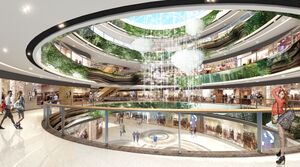
The station's promenade rings the arboretum, offering hundreds of restaurants, bars, and shops along a broad six-kilometer-long boulevard. These venues are a mix of Starfleet-run restaurants and bars with holographic staff offering replicated food and authentic, biologically-run establishments that serve non-replicated items. There are also several transporter rooms in this area, offering quick access to the crews of visiting starships. Many of the venues in this area have views of space through massive viewports, but those on the interior side have simulated views instead. The promenade runs under the terrain of the arboretum, with the space above and behind it packed with the equipment that keeps the arboretum running, along with several entrances that connect to the arboretum's parklands through structures resembling subway stations or gazebos, which allow for the free flow of personnel between the arboretum and the promenade.
Gymnasia & Sporting Venues
Starbase 72 has several dozen general purpose gymnasia, and an equal number of specialized sporting venues for everything from fencing to handball to parises squares. These facilities can be reserved on a first-come first-serve basis through the computer, and there are many intramural sports teams on the station that often allow visiting crew to participate in their games.
Theaters
Along with the amphitheater on the arboretum deck, Starbase 72 is equipped with numerous theaters: some for intimate productions with only a few dozen in the audience and others that can seat two thousand spectators. These venues are also used for briefings and training exercises, but often host visiting theater troupes or musical groups alongside the musicians drawn from the station's crew and residents.
Departure and Arrival Lounges
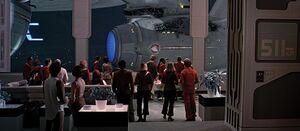
There are large lounges in the primary docking facility that offer impressive views of the starships docked with the station. Many crew members like to relax and eat meals here, so that they can watch the comings and goings of the ships. They are often particularly busy when a famous starship arrives.
Starbase 72 In-Play
- Starbase 72 is a large station, much larger than Deep Space 9 and home to tens of thousands of people, so it's easy to get lost in the crowd.
- If you're a new officer in Task Force 72, you'd likely spend some time here before you're assigned your own command, either leading a hazard team, honing your diplomatic skills through training exercises, or in some other capacity on the base.
- Starbase 72 has access to every class of Starfleet runabout.
- This station is very close to the Cardassian border, and so it's very likely that you'll encounter Cardassian military and civilian vessels visiting the station.
Notable Crew
These characters are available for use in your own fiction or if your game (RPG) visits Starbase 72. Their biographies are written to give you ideas on how to use them, and they are written with a diverse set of personalities and roles. Commodore Jalian is talkative and friendly; she wants to know everyone who serves under her. Captain Mortcombe is precise, reserved, and down-to-business, if you're looking for a character who won't talk your ear off. Commander Vane handles repairs and refits of visiting starships, so if you need a new nacelle or two, she's your go-to person, but watch out: she doesn't take being second-guessed well at all.
- Commanding Officer: Commodore Jalian, Saurian Female
- Executive Officer: Captain Leighton Mortcombe, Human Male
- Head of Shipyard Operations: Commander Melissa Vane, Human Female

